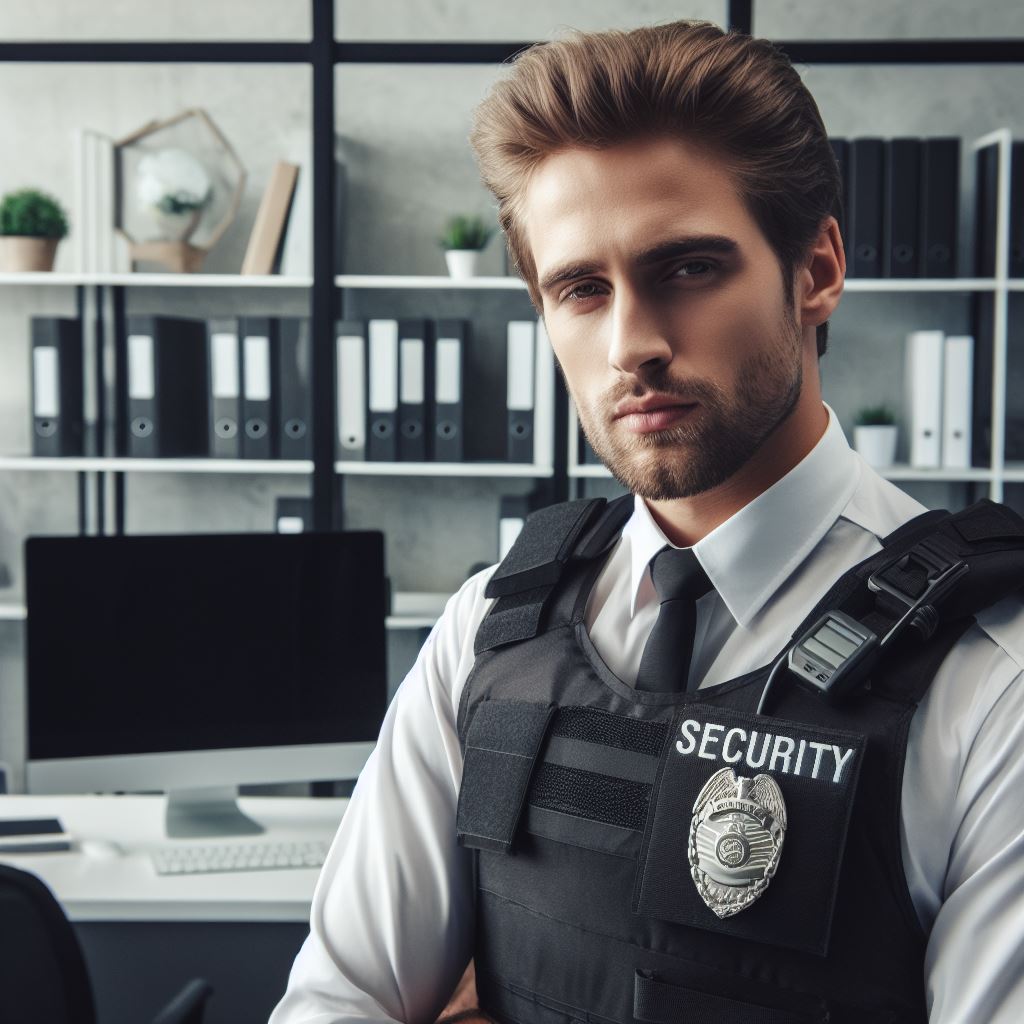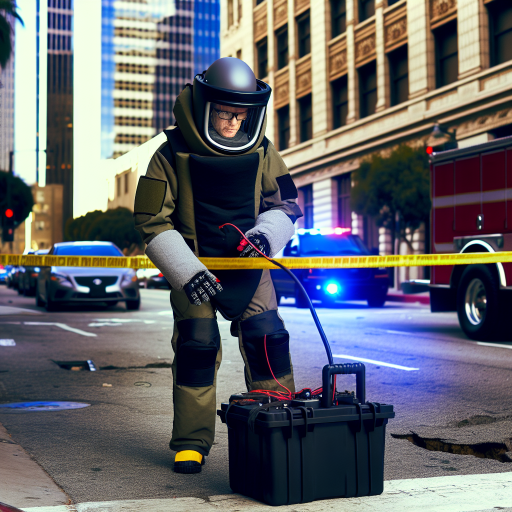Introduction
Role of a U.S. security guard
A U.S. security guard plays a crucial role in safeguarding people and property. It is essential for them to understand their legal rights and responsibilities.
The role of a U.S. security guard involves protecting individuals and assets from potential harm or threats.
Importance of understanding legal rights and responsibilities
Understanding legal rights and responsibilities is vital as it ensures that security guards operate within the boundaries of the law.
By knowing their legal rights, security guards can effectively respond to different situations and make informed decisions.
Responsibilities such as maintaining the safety and security of the premises, enforcing rules and regulations, and conducting patrols are crucial for a security guard.
Adhering to legal obligations is essential to avoid legal consequences and protect the interests of all parties involved.
Security guards need to be aware of the laws pertaining to self-defense, use of force, and detention of individuals.
They also need to understand privacy laws, trespassing laws, and the proper procedures for handling incidents.
Having a clear understanding of their legal rights and responsibilities empowers security guards to effectively carry out their duties.
By adhering to the law, security guards contribute to the overall safety and well-being of the individuals and properties they protect.
Most importantly, the role of a U.S. security guard is crucial, and understanding legal rights and responsibilities is vital for their effectiveness.
Legal Rights of a U.S. Security Guard
Overview of the rights granted by federal and state laws
- U.S. security guards are entitled to various legal rights granted by both federal and state laws.
- These laws ensure that security guards have the necessary protections while performing their duties.
- Security guards have the right to a safe and healthy working environment.
- They are protected from workplace discrimination and harassment.
- They also have the right to fair compensation and benefits as per the employment laws.
Right to self-defense and use of force
- A crucial legal right of U.S. security guards is the right to self-defense and the use of reasonable force.
- Security guards can use reasonable force when necessary to protect themselves or others from harm.
- However, it is essential to understand the concept of reasonable force to avoid unnecessary legal complications.
- Training on self-defense techniques and the proper use of force is crucial for security guards.
- Security guards must always prioritize de-escalation techniques before resorting to force.
Explanation of the rights to detain and arrest individuals
- Another important legal right of U.S. security guards is the authority to detain and arrest individuals under certain circumstances.
- Security guards can detain an individual if they have reasonable suspicion that a crime has been committed.
- They can only make a citizen’s arrest if they witness a misdemeanor or a felony occurring in their presence.
- However, it is crucial for security guards to understand the limitations of their authority.
- They should cooperate and coordinate with law enforcement agencies when necessary.
The importance of knowing the limits and conditions of legal rights
- Security guards must have a comprehensive understanding of the limits and conditions of their legal rights.
- Failure to adhere to these limits can lead to legal consequences, including civil lawsuits or criminal charges.
- Knowing the boundaries of their legal authority helps security guards to perform their duties responsibly.
- Regular training and updates on legal rights and responsibilities are crucial for security guards.
- By staying informed, security guards can protect themselves, their employers, and the general public.
In addition, U.S. security guards are granted various legal rights by federal and state laws.
These rights include the right to self-defense and the use of reasonable force, the authority to detain and arrest individuals, and the right to fair treatment in the workplace.
However, security guards must understand the limitations and conditions of these rights to avoid legal complications.
Regular training on legal rights and responsibilities is essential for security guards to perform their duties effectively while staying within the boundaries of the law.
Read: The Physical Demands: Firefighter Fitness Standards
Responsibilities of a U.S. Security Guard
Primary duties and responsibilities
- Maintaining a visible presence to deter illegal and unauthorized actions.
- Monitoring and authorizing entrance and departure of employees, visitors, and other individuals.
- Patrolling the premises to prevent and detect signs of intrusion or any other security breaches.
- Ensuring the security, safety, and well-being of all personnel, visitors, and property.
- Responding promptly to alarms and investigating disturbances.
- Writing reports on observations, incidents, and suspicious activities.
- Conducting routine inspections of access points and security equipment.
- Cooperating with law enforcement agencies and emergency services in case of emergencies.
- Providing assistance to customers, employees, and visitors in a courteous and professional manner.
- Enforcing rules and regulations to maintain order and discipline.
Importance of maintaining a safe and secure environment
A safe and secure environment is vital to protect the lives, property, and assets of individuals and organizations.
It promotes a sense of trust and confidence among the people, creating a conducive atmosphere for effective work and daily activities.
Security guards play a crucial role in maintaining this environment by preventing criminal activities, mitigating risks, and responding promptly to any security incidents.
Their presence alone acts as a deterrent to potential wrongdoers, reducing the likelihood of illegal actions.
Moreover, a safe and secure environment fosters productivity, as employees and visitors can focus on their tasks without constantly worrying about their safety.
Responsibility to protect property and assets
As a U.S. security guard, one of the primary responsibilities is safeguarding property and assets from theft, damage, or unauthorized access.
This duty involves keeping a watchful eye on entrances, limiting access to restricted areas, and conducting thorough checks of belongings to prevent the introduction of prohibited items on premises.
Security guards are also entrusted with monitoring surveillance systems and promptly responding to any security breaches or suspicious activities.
By effectively protecting property and assets, security guards contribute to the financial stability and operational continuity of organizations.
Importance of adhering to company policies and procedures
Adhering to company policies and procedures is crucial for security guards to fulfill their responsibilities effectively.
These guidelines outline the expected behaviors, protocols, and responsibilities specific to each security assignment.
By following these policies, security guards ensure consistency in their actions and maintain a professional image.
Adherence to procedures also ensures that security measures are implemented correctly and consistently, reducing the chances of errors and security vulnerabilities.
Security guards who strictly adhere to company policies contribute to the overall efficiency and effectiveness of security operations while maintaining compliance with legal and regulatory requirements.
In review, a U.S. security guard holds significant responsibilities in maintaining a safe and secure environment.
Through their presence, vigilance, and adherence to company policies, security guards help protect property, assets, and people.
Their dedication and commitment contribute to a safer society, instilling confidence among individuals and organizations alike.
Read: Diversity in U.S. Fire Departments: Current Trends

Licensing and Certification
In order to work as a security guard in the United States, individuals must meet certain licensing and certification requirements.
These requirements ensure that security guards are trained and equipped to handle their responsibilities effectively. Let’s take a closer look at the licensing and certification processes for security guards.
Licensing and Certification Requirements for Security Guards
Licensing and certification requirements for security guards vary from state to state. However, most states require security guards to obtain a license before they can legally work in the field.
This license demonstrates that individuals have completed the necessary training and are qualified to perform their duties.
Transform Your Career Today
Unlock a personalized career strategy that drives real results. Get tailored advice and a roadmap designed just for you.
Start NowTraining and Education Necessary to Obtain the License
To obtain a security guard license, individuals must complete specific training and education programs.
These programs cover a wide range of topics, including security procedures, emergency response, and legal aspects of the job.
In some states, aspiring security guards must also pass a written exam to demonstrate their knowledge and understanding of these topics.
The training and education necessary to obtain a security guard license can be obtained through private security firms, vocational schools, or community colleges.
These programs provide individuals with the knowledge and skills required to perform their duties effectively and responsibly.
Role of Regulatory Agencies in Ensuring Compliance
Regulatory agencies play a crucial role in ensuring that security guards comply with licensing and certification requirements.
These agencies are responsible for overseeing the licensing process, conducting background checks, and enforcing regulations.
They work to maintain high standards in the security industry and protect the public’s safety.
Regulatory agencies also have the authority to investigate complaints against security guards and take appropriate actions, such as revoking or suspending licenses, if necessary.
This ensures that security guards uphold the legal rights and responsibilities associated with their profession.
In addition to licensing and certification requirements, security guards must also adhere to specific codes of conduct and follow established protocols.
This includes maintaining confidentiality, using force only when necessary, and treating all individuals with respect and fairness.
In fact, licensing and certification requirements are essential for security guards in the United States.
These requirements ensure that individuals have the necessary training and education to perform their duties effectively and responsibly.
Regulatory agencies play a vital role in enforcing these requirements and maintaining high standards in the security industry.
By complying with licensing and certification regulations, security guards can fulfill their legal rights and responsibilities while protecting the public’s safety.
Read: Understanding the Roles of Firefighters in U.S. Cities
Uncover the Details: Essential Skills Every Security Guard Should Master in the USA
Legal Issues and Liabilities for Security Guards
Potential legal issues and liabilities faced by security guards
- Security guards face various potential legal issues and liabilities in the performance of their duties.
- Upholding privacy and confidentiality is crucial for security guards to maintain trust and protect individuals’ rights.
- Violating the law or being negligent can result in severe consequences for security guards.
- Understanding and following legal guidelines and protocols is of utmost importance in their role.
Security guards play a vital role in ensuring the safety and security of individuals and properties.
However, in fulfilling their duties, they must navigate several legal issues and liabilities to ensure that their actions are within the bounds of the law.
The importance of upholding privacy and confidentiality
One significant aspect of a security guard’s responsibilities is to uphold privacy and confidentiality.
Clients, employees, and visitors trust security guards with sensitive information, and it is essential to respect their privacy rights.
Any unauthorized disclosure of confidential information can lead to legal consequences and damage the reputation of both the security guard and the organization they represent.
Potential consequences for violating the law or being negligent
In addition to privacy concerns, security guards must familiarize themselves with potential legal liabilities and consequences for violating the law or being negligent.
The consequences can range from fines and civil lawsuits to criminal charges, depending on the severity of the violation.
For example, using excessive force, engaging in discriminatory practices, or neglecting duty of care can result in legal actions against the security guard and their employer.
Therefore, it is crucial for security guards to have a solid understanding of the legal guidelines and protocols that govern their profession.
By being knowledgeable about laws relating to search and seizure, use of force, and privacy rights, security guards can effectively perform their duties while minimizing legal risks.
Regular training and education on relevant laws and regulations should be a priority for security guard agencies and employers.
The importance of understanding and following legal guidelines and protocols
Moreover, security guard agencies and employers have a responsibility to ensure that their employees are well-informed about the legal implications of their actions.
It is crucial for organizations to provide clear guidelines and protocols to follow, emphasizing the importance of legal compliance.
Regular audits and reviews can help identify areas that need improvement and ensure that security guards are upholding the law.
Basically, security guards face various legal issues and liabilities while carrying out their duties. Upholding privacy and confidentiality is paramount, as any breach can have severe consequences.
Violating the law or being negligent can result in legal actions and damage reputation.
Therefore, it is crucial for security guards to understand and follow legal guidelines and protocols to minimize risks and ensure the safety and rights of all individuals involved.
Read: The Journey to Becoming a U.S. Firefighter: Steps Explained
See Related Content: Women in Detective Roles: Breaking Barriers in the US
Explore Further: The Role of Campus Security in Crisis Management
Conclusion
In short, it is crucial for every U.S. security guard to be well-aware of their legal rights and responsibilities.
By recapitulating the legal framework that governs security guards, it ensures they fulfill their duties efficiently.
Moreover, staying informed about legal updates and changes is of paramount importance in this role. As laws evolve, security guards must adapt to ensure they operate within legal boundaries.
Transform Your Career Today
Unlock a personalized career strategy that drives real results. Get tailored advice and a roadmap designed just for you.
Start NowLastly, maintaining professionalism and ethical conduct is a fundamental aspect of being a security guard. Professionalism not only elevates the industry, but it also promotes trust and confidence among clients.
Adhering to ethical standards fosters integrity and ensures guards carry out their responsibilities ethically.
In a nutshell, a U.S. security guard’s commitment to upholding legal rights and responsibilities whilst maintaining professionalism and ethical conduct is crucial.
By doing so, they contribute to a safe and secure environment for everyone. So, let us all strive to be vigilant, informed, professional, and ethical security guards.




